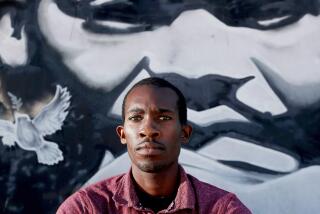Ex-Boston Gang Member, Now a Top Policeman, Builds Trust Among ‘My People’
- Share via
BOSTON — His formal title is police Deputy Supt. William Celester, but everyone knows him as Billy, the former gang member who learned early to be quick on his feet.
Celester started out as a teen-age member of the Marseilles Dukes but today spends 16-hour shifts running things down at Area B police station in Roxbury, where murder and drug abuse cast a constant, long shadow.
He has reinstituted neighborhood block watches, has his officers walking regular beats and meets daily with community activists. He’s at the schools, in the churches, cruising the streets late at night.
The hard-won relationship between the people who live on Area B’s raggedy streets and those who police them has caught the attention of leaders nationwide, including Mayor-elect David N. Dinkins of New York, who has been considering Celester for a top police post.
Gang- and drug-related crimes are still rampant, but there is a new openness in the neighborhoods. Wherever he goes, Celester walks into open arms. People honk and wave to him on the streets, residents of the city’s housing projects swing open their doors when they see him coming.
“These are my people,” Celester, 46, said during a recent interview at his chaotic office. “My whole life has prepared me for this job,”
The story could have come out differently.
Celester, a ninth-grade dropout, spent his teens running with the Dukes. He married at 16, divorced a year later and got caught up in street fights. He was sentenced to six months in jail for failing to pay child support for a son born out of wedlock.
By the time he had finished his jail term at age 17, Celester says he was already embittered.
“I came out and, sure, I was angry. I hated the system and didn’t want anything to do with it,” he said. “I could easily have gone the other way, but I had support--something a lot of kids today don’t have.”
Celester drew inspiration from community elders such as former state Sen. Royal L. Bolling, who persuaded him that a life outside the law was no life at all.
“They convinced me not to hate,” Celester said. “They convinced me to pick myself up and work to make things better.”
Celester went back to school, eventually earning a master’s degree in criminal justice. He joined the police force in the mid-1960s at the suggestion of civil rights activists, who thought the 23-year-old should take a shot at restoring the community’s pride.
“Billy grew up here and he takes trouble on the streets to heart,” said Bolling. “He knows the people he’s dealing with very personally and he has a deep understanding of the problems.”
During his 25 years with the Boston police, Celester has kept the vision of a more simple time, one in which grandparents strolled the streets at night and mothers were seldom afraid for their children.
“Babies are dying,” said Celester, who has three grown children. “I can’t get used to seeing kids laying dead in the streets.”
More than half of the 100 or so homicides committed in Boston so far this year have been in Area B and 3,486 drug arrests were logged in those same neighborhoods between January and October.
Activist Georgette Watson said street violence is tough to stop, but Celester has had a series of “rap sessions” with gang members and the tenuous relationship could make a difference.
Watson said gang members aren’t open to anyone, but they relate to Celester because he was raised in Roxbury and is a black man.
“You can’t really tell if they trust him or not, but at least they’re talking,” she said.
More to Read
Sign up for Essential California
The most important California stories and recommendations in your inbox every morning.
You may occasionally receive promotional content from the Los Angeles Times.













